Top Rankings
Scotland County Schools School District ranks among the top 20% of public school district in North Carolina for:
Category
Attribute
Community Size
Largest student body (number of students) (Top 1%)
For the 2025 school year, there are 8 public elementary schools serving 3,934 students in Scotland County Schools School District. This district's average elementary testing ranking is 2/10, which is in the bottom 50% of public elementary schools in North Carolina.
Public Elementary Schools in Scotland County Schools School District have an average math proficiency score of 31% (versus the North Carolina public elementary school average of 50%), and reading proficiency score of 30% (versus the 49% statewide average).
Minority enrollment is 79% of the student body (majority Black), which is more than the North Carolina public elementary school average of 57% (majority Black and Hispanic).
Overview
This School District
This State (NC)
# Schools
10 Schools
2,174 Schools
# Students
5,529 Students
1,091,007 Students
# Teachers
352 Teachers
73,903 Teachers
Student : Teacher Ratio
16:1
16:1
District Rank
Scotland County Schools School District, which is ranked within the bottom 50% of all 320 school districts in North Carolina (based off of combined math and reading proficiency testing data) for the 2021-2022 school year.
The school district's graduation rate of 90% has increased from 83% over five school years.
Overall District Rank
#271 out of 325 school districts
(Bottom 50%)
(Bottom 50%)
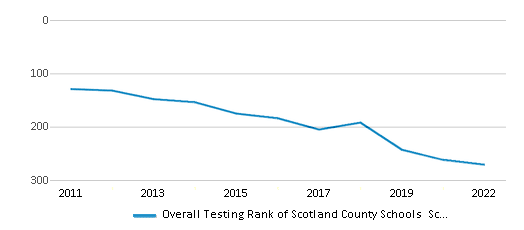
Math Test Scores (% Proficient)
32%
51%
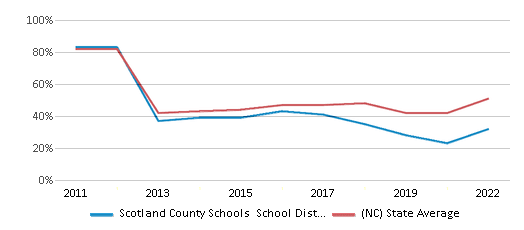
Reading/Language Arts Test Scores (% Proficient)
32%
50%
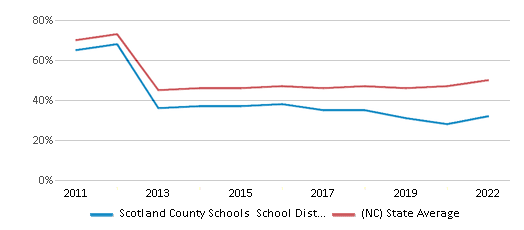
Science Test Scores (% Proficient)
48%
63%
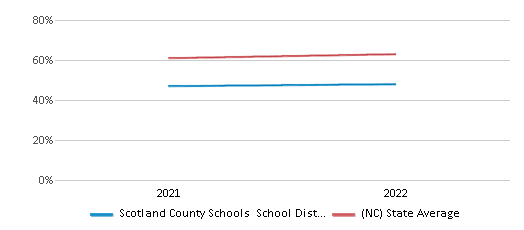
Graduation Rate
90%
86%
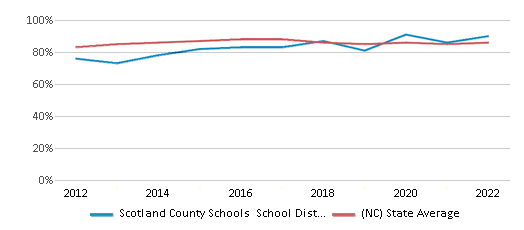
Students by Ethnicity:
Diversity Score
0.68
0.72
# American Indian Students
861 Students
12,383 Students
% American Indian Students
16%
1%
# Asian Students
51 Students
47,310 Students
% Asian Students
1%
4%
# Hispanic Students
236 Students
227,576 Students
% Hispanic Students
4%
21%
# Black Students
2,699 Students
268,051 Students
% Black Students
49%
25%
# White Students
1,283 Students
465,086 Students
% White Students
23%
43%
# Hawaiian Students
9 Students
1,488 Students
% Hawaiian Students
n/a
n/a
# Two or more races Students
394 Students
69,126 Students
% of Two or more races Students
7%
6%
Students by Grade:
# Students in PK Grade:
165
23,192
# Students in K Grade:
395
109,971
# Students in 1st Grade:
435
114,331
# Students in 2nd Grade:
409
118,121
# Students in 3rd Grade:
399
111,941
# Students in 4th Grade:
393
114,493
# Students in 5th Grade:
370
115,565
# Students in 6th Grade:
384
116,023
# Students in 7th Grade:
445
113,393
# Students in 8th Grade:
426
115,504
# Students in 9th Grade:
434
11,612
# Students in 10th Grade:
452
10,182
# Students in 11th Grade:
424
8,704
# Students in 12th Grade:
398
7,975
# Ungraded Students:
-
-
District Revenue and Spending
The revenue/student of $12,812 is higher than the state median of $11,187. The school district revenue/student has stayed relatively flat over four school years.
The school district's spending/student of $13,323 is higher than the state median of $11,612. The school district spending/student has stayed relatively flat over four school years.
Total Revenue
$71 MM
$17,307 MM
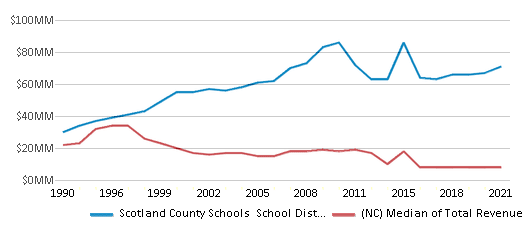
Spending
$74 MM
$17,964 MM
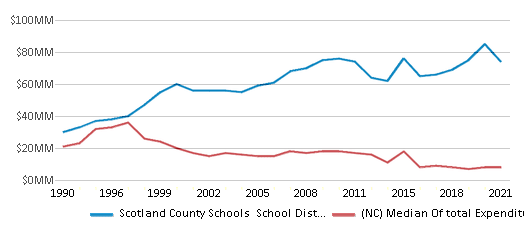
Revenue / Student
$12,812
$11,187
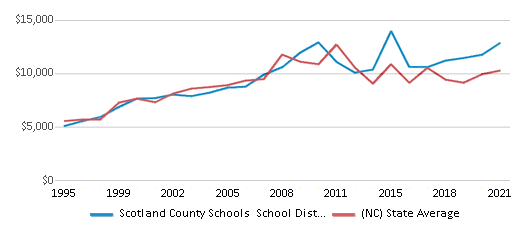
Spending / Student
$13,323
$11,612
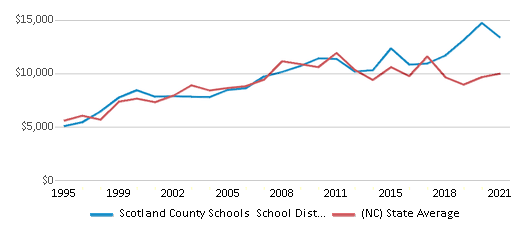
Best Scotland County Schools School District Public Elementary Schools (2025)
School
(Math and Reading Proficiency)
(Math and Reading Proficiency)
Location
Grades
Students
Rank: #11.
Shaw Academy
Alternative School
(Math: <50% | Reading: <50%)
Rank:
Rank:
6/
Top 50%10
18700 Old Wire Road
Laurinburg, NC 28352
(910) 276-0611
Laurinburg, NC 28352
(910) 276-0611
Grades: 6-12
| 120 students
Rank: #22.
South Johnson Elementary School
(Math: 38% | Reading: 37%)
Rank:
Rank:
3/
Bottom 50%10
13100 Old Johns Rd
Laurinburg, NC 28352
(910) 276-2469
Laurinburg, NC 28352
(910) 276-2469
Grades: PK-5
| 636 students
Rank: #33.
Spring Hill Middle School
Magnet School
(Math: 37% | Reading: 33%)
Rank:
Rank:
3/
Bottom 50%10
22801 Airbase Road
Laurinburg, NC 28352
(910) 369-0590
Laurinburg, NC 28352
(910) 369-0590
Grades: 6-8
| 634 students
Rank: #44.
Laurel Hill Elementary School
(Math: 36% | Reading: 30%)
Rank:
Rank:
2/
Bottom 50%10
11340 Old Wire Road
Laurel Hill, NC 28351
(910) 462-2111
Laurel Hill, NC 28351
(910) 462-2111
Grades: PK-5
| 659 students
Rank: #55.
Wagram Elementary School
(Math: 24% | Reading: 31%)
Rank:
Rank:
2/
Bottom 50%10
24081 Main Street
Wagram, NC 28396
(910) 369-2252
Wagram, NC 28396
(910) 369-2252
Grades: PK-5
| 506 students
Rank: #66.
Sycamore Lane Elementary School
(Math: 24% | Reading: 28%)
Rank:
Rank:
1/
Bottom 50%10
2100 Sycamore Lane
Laurinburg, NC 28352
(910) 277-4350
Laurinburg, NC 28352
(910) 277-4350
Grades: 3-5
| 333 students
Rank: #77.
Carver Middle School
(Math: 24% | Reading: 25%)
Rank:
Rank:
1/
Bottom 50%10
18601 Fieldcrest Road
Laurel Hill, NC 28351
(910) 462-4669
Laurel Hill, NC 28351
(910) 462-4669
Grades: 6-8
| 614 students
Rank: n/an/a
2098 Elm Ave
Laurinburg, NC 28352
(910) 266-0001
Laurinburg, NC 28352
(910) 266-0001
Grades: PK-2
| 432 students
Recent Articles

Sexual Harassment at Age 6: The Tale of a First Grade Suspension
A six-year old in Aurora, Colorado, was suspended after singing an LMFAO song to a little girl in his class and reportedly “shaking his booty.” We look at the case and the sexual harassment problem in public schools today.

How Scaffolding Could Change the Way Your Child Learns
This article explores the concept of instructional scaffolding, a teaching method that enhances learning by breaking down complex tasks into manageable parts. It highlights how scaffolding supports students in developing critical thinking skills and becoming more independent learners. The article discusses the benefits of scaffolding, including improved engagement and reduced anxiety, and provides strategies for its implementation across various educational levels.

February 05, 2025
Understanding the U.S. Department of Education: Structure, Impact, and EvolutionWe explore how the Department of Education shapes American education, from its cabinet-level leadership to its impact on millions of students, written for general audiences seeking clarity on this vital institution.





